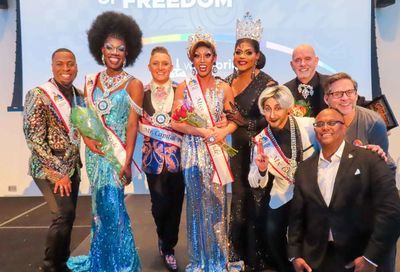Prop 8 Supporters, Opponents Argue — Again — About Whether Trial Ruling Can Be Appealed
Despite a recent California Supreme Court opinion stating that the proponents of California’s Proposition 8 have the authority under state law to assert the state’s interest in court, opponents of the initiative today told a federal appeals court that those proponents lack the required standing to pursue an appeal before the federal court. Supporters of Proposition 8 fought back, telling the court that a state has the authority to decide who can defend its own laws in court.
 The question, which pits the high value the state of California places on the initiative right against the federal constitutional requirement that cases before federal courts involve an actual “case or controversy,” must be answered before the U.S. Court of Appeals for the Ninth Circuit can consider whether or not to uphold U.S. District Court Judge Vaughn Walker’s August 2010 decision striking down Proposition 8 as unconstitutional.
The question, which pits the high value the state of California places on the initiative right against the federal constitutional requirement that cases before federal courts involve an actual “case or controversy,” must be answered before the U.S. Court of Appeals for the Ninth Circuit can consider whether or not to uphold U.S. District Court Judge Vaughn Walker’s August 2010 decision striking down Proposition 8 as unconstitutional.
If the appeals court determines that the proponents have standing to bring the appeal, then it will consider the underlying issue of Proposition 8’s constitutionality. If there is no standing, then it is likely that Walker’s initial decision will stand — although the standing decision could and likely would be appealed to the U.S. Supreme Court by the proponents.
The issue has come about because the state defendants in the case, who decided not to defend Proposition 8 at trial when it was challenged, also decided not to appeal Walker’s decision that the initiative was unconstitutional. The state defendants did not file any brief about their interpretation of the impact of the California Supreme Court’s opinion upon the federal standing question.
The plaintiffs challenging Proposition 8 argued, “Nothing in that decision alters the fact that Proponents lack standing to pursue this appeal. Even though Proponents possess the right under California law to assert the State’s interest in the validity of Proposition 8, their standing under Article III depends on their ability to establish that the invalidation of Proposition 8 would cause them a ‘personal, particularized, [and] concrete’ injury.”
The tone differs in a sense from comments made by the plaintiffs’ lawyers on the day the California Supreme Court issued its answer to the question sent to it by the Ninth Circuit. The plaintiffs’ lead attorney, Ted Olson, told reporters on Nov. 17, “[The Ninth Circuit judges hearing the appeal]’ve pretty much locked themselves in and agreed to accept whatever the [California Supreme Court] said.”
In its filing, the proponents of Proposition 8 argue just that, noting, “The Supreme Court’s precedents … establish the unremarkable proposition that state law determines who is authorized to assert this interest on behalf of the State.”
The plaintiffs, however, argue, “Proponents would not suffer any personalized injury as a result of the invalidation of Proposition 8, and thus are unable to satisfy the requirements of [the Constitution], even if their right under state law to represent the interests of the State is taken into account.”
The proponents, by contrast, argue in today’s filing that Supreme Court precedent relied upon by the plaintiffs relates only to states in which there was no state-granted authority as the California Supreme Court stated exists here. “Because Proponents are authorized by California law to assert the State’s interest in defending the constitutionality of its laws—an interest that is indisputably sufficient to confer appellate jurisdiction—they plainly have standing to appeal the district court’s judgment invalidating Proposition 8,” the proponents’ lawyers write.
In the brief filed by the City and County of San Francisco, it agreed with the plaintiffs but also raised another issue — about the type of defense that had been brought by the proponents at trial and on appeal. Lawyers argued, “[I]f Proponents are to stand in the shoes of the State, they should not advance arguments at odds with the State’s law and policy.” The lawyers pointed, for example, to the proponents’ argument that “Californians were entitled to rely on purported uncertainty about whether lesbian and gay couples are equally worthy parents as opposite-sex couples biologically related to the children they rear,” noting that California law makes no such distinction.
Although there are oral arguments slated for 2:30 p.m. Pacific Time Dec. 8 on two related issues — whether the public release of videotapes made of the trial should be allowed and whether Walker “should be disqualified from presiding over the case because he was involved in a same-sex relationship at the time” — there are no oral arguments scheduled at this time on the standing question or the underlying merits of the Proposition 8 challenge, now named Perry v. Brown.
READ:
- Proponents’ filing:Proponents-PostCSC.pdf
- Plaintiffs’ filing: Plaintiffs-PostCSC.pdf
- San Francisco filing: SanFran-PostCSC.pdf
Support Metro Weekly’s Journalism
These are challenging times for news organizations. And yet it’s crucial we stay active and provide vital resources and information to both our local readers and the world. So won’t you please take a moment and consider supporting Metro Weekly with a membership? For as little as $5 a month, you can help ensure Metro Weekly magazine and MetroWeekly.com remain free, viable resources as we provide the best, most diverse, culturally-resonant LGBTQ coverage in both the D.C. region and around the world. Memberships come with exclusive perks and discounts, your own personal digital delivery of each week’s magazine (and an archive), access to our Member's Lounge when it launches this fall, and exclusive members-only items like Metro Weekly Membership Mugs and Tote Bags! Check out all our membership levels here and please join us today!



















